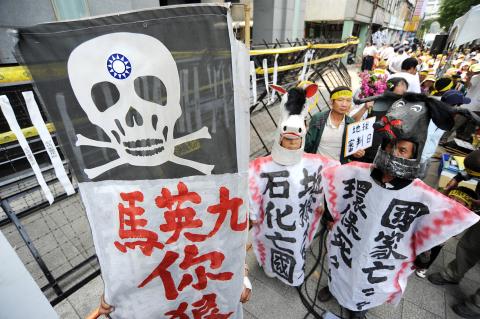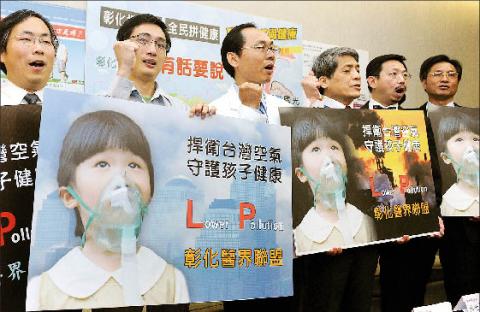The Environmental Protection Administration’s environmental impact assessment (EIA) committee yesterday failed to reach a conclusion on a proposed Kuokuang Petrochemical Technology Co (國光石化) naphtha cracker complex despite a marathon nine-hour discussion.
The committee will meet again today on whether to greenlight the complex being built in a wetland area in Changhua County.
At the last committee meeting on Jan. 28, Kuokuang was told it had to submit additional information about the project, which had been scaled back from its original proposal.

Photo: Lo Pei-der, Taipei Times
Yesterday’s meeting began with Kuokuang’s report about the possible impact of the reduced project — which would be constructed on a man-made island — on air pollution, health risks, changes to coastal geography, the endangered Indo-Pacific humpback dolphins and the area’s water supply.
The report concluded that the air pollution produced by the complex would be within regulation limits, the energy consumed could be reduced and that the plants that pose a higher health risk would be located further from land. The report said the plant would not extract groundwater, so it would not affect land subsidence, while protection of dolphins could be improved by setting up a foundation.
The report said the total economic benefits of the project could reach NT$286.2 billion (US$9.86 billion), larger than the external cost of NT$21.8 billion to NT$32.7 billion, and could provide more job opportunities.

Photo: Liao Chen-huei, Taipei Times
However, Lin Lien-tsung (林連宗), a resident of Changhua’s Fangyuan Township (芳苑), asked where the water supply would come from if a proposed diversion weir did not pass its own EIA.
Hsu Li-yi (許立儀), a resident of Dacheng Township (大城), said her family has lived in the area for generations, but she did not want her children to grow up on polluted land between two petrochemical sites in Yulin and Changhua counties.
Chen Chi-chung (陳吉仲), a National Chung Hsing University professor, said the company overestimated the plant’s benefits in its report. A recalculation of the possible health risks and medical costs would make the costs outweigh the benefits, Chen said.
The director of Yunlin County Government’s Economic Affairs Department, Huang Chiung-ya (黃瓊雅), said the petrochemical complex built by Formosa Plastics Group in Mailiao Township (麥寮) had severely polluted the environment, raising the risk of cancer for area residents and causing three accidents in the past two years.
Huang, representing Yunlin County Commissioner Su Chih-fen (蘇治芬), urged the committee members to consider their professional expertise and their conscience, and reject Kuokuang’s application to prevent the same kind of tragedy happening in Changhua.
Chan Chang-chuan (詹長權), a National Taiwan University professor, said that if members of the EIA panel were to use “environmental protection” as the professional standard in reviewing the case, then Kuokang’s application should be rejected because there is enough evidence that the plant would clearly impact the environment, society and residents’ health.
Approving the project would be a mistake and a violation of environmental justice, he said.
Meanwhile, outside the EPA’s headquarters, hundreds of Changhua County residents and students from universities nationwide, protested against the proposed plant’s negative impact on the environment and residents.
They said they hoped the panel would reject the project.
The students held mockups of newspapers bearing headlines proclaiming that the Kuokuang project had been canceled.
The mockups, dated April 22, had mastheads reading “United Oyster News” and “Oyster Times,” and were designed to show support for oyster farmers in Changhua whose livelihood is expected to be affected should the project be built.
“We cannot accept that the project will be approved, even conditionally, because the external costs are too high to be absorbed by the environment,” said Tsai Pei-hui (蔡培慧), a teacher at Shih Hsin University and the organizer of the mock newspapers..
At a separate setting, Democratic Progressive Party (DPP) lawmakers also called on the government to drop the project, citing environmental and health concerns.
Construction of the facility would also run counter to the government’s pledge to reduce carbon emissions, they said.
The proposed site — a protected wetlands — was the “kidney of Taiwan,” DPP Legislator Gao Jyh-peng (高志鵬) said.
“The DPP caucus is resolutely opposed to building a petrochemical plant there,” he said.
The DPP’s presidential hopefuls have also unanimously expressed disapproval of the project.
Tsai Ing-wen (蔡英文) said earlier this month that she hoped the facility could be built in or nearer to oil-producing regions in the Middle East, such as Saudi Arabia.
However, government agencies have sent mixed messages on the idea of building the plant overseas.
James Tien (田中光), director-general of the Ministry of Foreign Affairs’ Department of East Asian and Pacific Affairs, yesterday said that Malaysia and Indonesia were among a number of Southeast Asian countries that have expressed an interest in the Kuokuang project.
However, these countries have not submitted any substantial plans for hosting the project, Tien said.
ADDITIONAL REPORTING BY VINCENT Y. CHAO, SHIH HSIU-CHUAN AND CNA

ACTION PLAN: Taiwan would expand procurement from the US and encourage more companies to invest in the US to deepen bilateral cooperation, Lai said The government would not impose reciprocal tariffs in retaliation against US levies, President William Lai (賴清德) said yesterday, as he announced five strategies to address the issue, including pledging to increase Taiwanese companies’ investments in the US. Lai has in the past few days met with administrative and national security officials, as well as representatives from various industries, to explore countermeasures after US President Donald Trump on Wednesday last week announced a 32 percent duty on Taiwanese imports. In a video released yesterday evening, Lai said that Taiwan would not retaliate against the US with higher tariffs and Taiwanese companies’ commitments to

‘SPECIAL CHANNEL’: Taipei’s most important tasks are to stabilize industries affected by Trump’s trade tariffs and keep negotiations with Washington open, a source said National Security Council Secretary-General Joseph Wu (吳釗燮) arrived in the US for talks with US President Donald Trump’s administration, a source familiar with the matter said on Friday. Wu was leading a delegation for a meeting known as the “special channel,” the Financial Times reported earlier. It marked Trump’s first use of the channel since returning to the White House on Jan. 20. Citing a source familiar with the matter, the Financial Times reported that Minister of Foreign Affairs Lin Chia-lung (林佳龍) was also a part of the delegation. The visit came days after China concluded war games around Taiwan and amid Trump’s

Intelligence agents have recorded 510,000 instances of “controversial information” being spread online by the Chinese Communist Party (CCP) so far this year, the National Security Bureau (NSB) said in a report yesterday, as it warned of artificial intelligence (AI) being employed to generate destabilizing misinformation. The bureau submitted a written report to the Legislative Yuan in preparation for National Security Bureau Director-General Tsai Ming-yen’s (蔡明彥) appearance before the Foreign Affairs and National Defense Committee today. The CCP has been using cognitive warfare to divide Taiwanese society by commenting on controversial issues such as Taiwan Semiconductor Manufacturing Co’s (TSMC, 台積電) investments in the

HELPING HAND: The steering committee of the National Stabilization Fund is expected to hold a meeting to discuss how and when to utilize the fund to help buffer the sell-off The TAIEX plunged 2,065.87 points, or 9.7 percent, to close at 19,232.35 yesterday, the highest single-day percentage loss on record, as investors braced for US President Donald Trump’s tariffs after an extended holiday weekend. Amid the pessimistic atmosphere, 945 listed companies led by large-cap stocks — including Taiwan Semiconductor Manufacturing Co (TSMC, 台積電), Hon Hai Precision Industry Co (鴻海精密) and Largan Precision Co (大立光) — fell by the daily maximum of 10 percent at the close, Taiwan Stock Exchange data showed. The number of listed companies ending limit-down set a new record, the exchange said. The TAIEX plunged by daily maxiumu in just